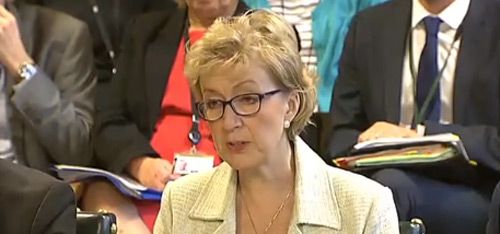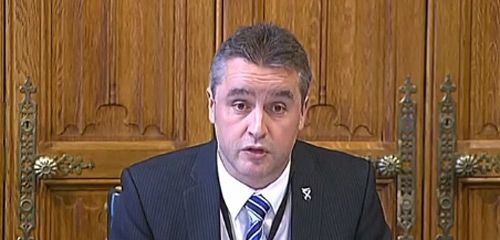


Members of the Department of Energy and Climate Change (DECC) have defended the department’s record over the summer against questioning from the Energy and Climate Change (ECC) Committee.
Andrea Leadsom MP, minister of state for DECC, was asked to give evidence on investor confidence in the UK and to what extent DECC’s policy announcements since May, which were made while Parliament was in recess, have impacted the market.
The ECC Committee’s investigation follows a prolonged period of policy change at DECC, with the closure of the Green Deal, scrapping of the zero carbon homes policy and the department’s plans to slash the solar Feed-in Tariff (FiT) all factoring in to the Committee’s questions.
In his opening statement, Committee chair Angus Brendan MacNeil of the SNP said: “We were disappointed that DECC decided to make important policy announcements during the summer recess rather than announce them in the House where all members might have had an opportunity to question ministers on both the reasons for and the potential impact of these decisions.
“Your department’s approach suggests sadly a lack of respect for the importance of the scrutiny function not just of this Committee, but of the whole House of Commons. The decisions have proved to be controversial indeed and there’s been considerable backlash from within the industry and international commentators, most recently Jacqueline McGlade.”
In response, Andrea Leadsom claimed that the Government was required to act as soon as possible to stop any potential overspend on the Levy Control Framework, which funds subsidies for renewable energy. She said: “There were some very serious implications for bill payers and affordability that needed to be addressed and because of the way the subsidies currently work, it wasn’t possible to wait until the house was sitting again for reasons of cost.”
Referencing a projection by the Office of Budget Responsibility (OBR) that the overspend could have reached £1.5bn by 2020, Ms. Leadsom added: “The overriding priority of protecting the bill payer from a significant overspend on the budget for renewables subsidies was an urgent priority. The problem, if we had waited and delayed for longer, is that you just eek out the decision making and then run the risk of an even bigger spike in spending, and that was what we were keen to avoid.”
The closure of the Green Deal on July 23 – just days after energy secretary Amber Rudd appeared before the ECC Committee – is an example of this urgent financial action. According to Ms. Leadsom, DECC pulled funding from the Green Deal Finance Company (effectively closing the scheme) due to low take-up, which meant taxpayers were paying for an organisation that “wasn’t generating sufficient business.”
When asked if the scheme’s closure was a sign of a lack of commitment from the Government on energy efficiency policy, Ms. Leadsom replied: “That was very clearly to protect the taxpayer, so it doesn’t say anything about a commitment — or lack of – to energy efficiency.”
As well as those focused on the end of the Green Deal, Ms. Leadsom faced strong questions on DECC’s consultation on the FiT, which closed on Friday October 26. The plans to cut solar subsidy under the scheme by 87% has sparked a considerable backlash from the industry and some members of the public, with Angus Brendan MacNeil drawing attention to a parliamentary petition against the changes, which has already gained over 26,000 signatures. In one question, Mr. NacNeil suggested that the reaction to the cuts is “almost appearing to mirror – not quite in the same way – the trouble the Government is having with welfare cuts.”
Ms. Leadsom began by asserting that, at the time of speaking, the plans were still out for consultation and that no decisions had been made yet. She added that due to the prolonged period of Government subsidy under the FiT, solar deployment had exceeded expectations and was due for re-evaluation, referencing support from within the solar industry itself.
She said: “[Some] in the solar industry have said they completely agree that the subsidy is too high. They do not necessarily think that the proposal in the consultation is high enough, but they agree that it needed to be looked at. There is a whole raft — pages and pages — of feedback from industry and from brokers saying that there is still confidence in the sector and that this is a short-term issue that needs to be got over.
“I think that the investor confidence is absolutely vital, but I do not believe that the feedback is as bad as you are implying.”
Despite this view, there has been substantial push back on the Government’s plans, particularly in light of the jobs that could be put at risk. According to the Solar Trade Association, around 27,000 jobs will be in jeopardy from cuts to the FiT, with the first losses already recorded following the closures of three energy firms associated with solar.
In its impact assessment on the proposals, DECC failed to include a job loss estimate as, according to Ms. Leadsom, it was unclear how many jobs would be affected by the changes. She said: “There is no clear data on how many jobs are entirely dependent on the FiT, so it is not true to say that any business that has some involvement with the solar industry is, therefore, at risk of closure if the FiT changes. That is just a non sequitur, because a lot of businesses that have involvement in the solar business are also involved with, for example, other renewables activities – home improvement businesses and so on – so there is no clear data.
“BIS [Department of Business, Innovation and Skills] had put forward figures of around 34,000 people involved in the solar industry, but there is no clear data on how many of those jobs are there only because the FiT is set at [the] the level it is. It is only through the consultation that we will have really clear numbers on that.”
She went on to suggest that DECC would consider jobs in its review of consultation responses, however Ms. Leadson also echoed Amber Rudd’s message in her party conference speech and re-emphasised that the Government would continue to work for a subsidy free industry.
“It is vital that industries, over time, stand on their own two feet. I don’t believe that anybody here would advocate an industry that survives only because of a subsidy paid by the bill payer,” she said.



